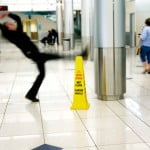Season of the Slip
Slip and fall accidents are serious personal injuries that cause thousands of hospital trips and accidental deaths each year.
Winter is slippery in Maryland. Snowstorms and ice storms seriously impact travel and cause school closures.
For personal injury attorneys, winter is officially the slip and fall season.
Snow and ice can cause serious personal injuries like severe hematomas and bone fractures. Even though these personal injuries are treatable, the impact is huge. The National Safety Council estimates that slip and falls are second to motor vehicle collisions in the number of accidental deaths and injuries they cause.
In 2009, approximately 25,000 people died from slip and fall accidents, and not surprisingly, senior citizens were the most common victims. Age related issues make the 65 and older demographic very susceptible to not only slipping and falling on snowy and icy surfaces, but also incurring personal injuries. In fact, seniors are 33% more likely to incur personal injuries if they fall. Broken hip bones, knees, and other personal injuries are severe, and even life threatening for the elderly.
One myth about slip and falls is that homeowners and property owners have to clear their sidewalks or they could be liable for a slip and fall injury. Generally, property owners are not responsible for shoveling and salting public sidewalks that are maintained by local government. Similarly, they are generally not responsible for injuries resulting from a slip and fall on public sidewalks. People have a personal responsibility to watch their step and not tread where it is potentially dangerous . The law in Maryland concludes that those who knowingly tread where it may be dangerous have “assumed the risk” of a fall and cannot prevail in court.
However, a slip and fall becomes a legal issue when negligence is involved. Commonly Maryland courts have imposed liability on commercial property owners when they have had notice of the dangerous condition (or it was present long enough to infer that they ”should have known” about it) and did not take action to eliminate the danger. Property owners have a responsibility to know about any exceedingly dangerous conditions and to rectify them lest an unsuspecting public get injured.
In order to be legally responsible for a slip and fall, the owner of the premise or an employee must have somehow either caused the dangerous conditions, was negligently unaware of the dangerous condition or was actually aware of the problem yet did not take effective action to cure the condition.
So when Maryland gets another snowstorm, clearing the path is generally a good practice and the neighborly thing to do for both private and commercial property owners, even if in some circumstances it’s not mandatory.
For more information about the less slippery steps to take following a personal injury, please contact personal injury attorney Keith Franz at AFSLS.

